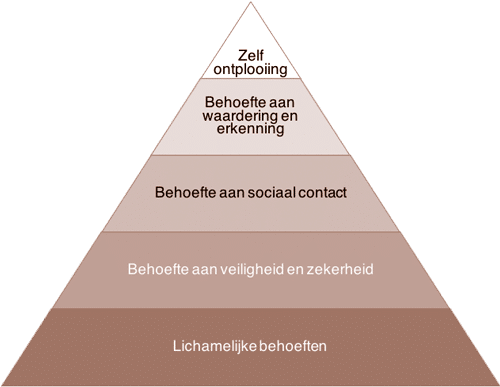Basic principles to start playing
In order to play, it is important that participants feel safe. Safety is the second rung on Maslow's "Hierarchy of Needs" (Maslow, 1943).

Pyramid of Maslow (Maslow, 1943)
Maslow ranked what he considered to be the universal needs of man in Maslow's Pyramid. According to his theory, man should strive to satisfy the needs placed higher in the hierarchy only after the lower needs have been satisfied.
Safety and security
An important threshold that can be overcome with providing safety is being able to surrender to the game. For many beginning Larpers (and non-Larpers), it takes effort to accept the reality of the game; they keep reverting in their minds to the reality they know. Only when that is stopped does immersion (= immersion in the game) take place. Then there can be experimentation (i.e. play) in the game. And only then has the player really stepped into the " Magic Circle," instead of watching or half-stepping in.
Physical needs
Forms of physical needs include being able to breathe, sleep, eat and drink. There is no point in participants playing the game if they are thirsty or hungry. As a Larp organization, therefore, make sure there is plenty of drink when it is hot and that there is food at appropriate times. An example of this is the Friday night snack at a Larp weekend event. If an organization is unclear about what will be served and at what time, a participant might count on the fact that if he arrives around 7 p.m. after a two-hour traffic jam, he can expect food within the hour. If the organization doesn't have the bite scheduled until around ten o'clock, then chances are that when the game kicks off, which is often around nine o'clock, the participant is not exactly eager to play.
A few organizations use thirst or hunger as part of immersion. One example is 0.5%, a club that organized a zombie Larp where drinking and eating were part of the game. Food and drink could be obtained at the risk of the participant's character being killed by the zombies. The risk here is that participants get out of their game because basic needs were not met in order to play. Hunger and thirst come before the need for play.
An anecdote about another bodily need, being comfortable in terms of temperature, comes from one of the directors of DOL Drama op Locatie. For one game, the client himself had sought a rather inexpensive solution for the venue. It was unheated and it was winter: it was particularly cold for the participants. In addition, the DOL director, who supervised that game, saw that the client's participants had little appetite for it. He shared his findings with the group and then, together with the participants, by rubbing hands together, started to warm the room. The playful action caused the participants to loosen up and feel a little less cold. With this intervention, it still turned out to be a fun game, with enthusiastic participants.
Role-playing is a form of self-development. As an organization, therefore, make sure that the other three steps are also taken care of. Playing in a public forest with many spectators does not promote a feeling of safety and security. Attention to new participants and informing them well, eliminating uncertainty, does provide a sense of security.
Social contacts
Encourage integration of newcomers into existing social structures. Let them become comfortable among the other participants. Make sure that existing groups of players who know each other through and through do not exclude new (individual) players: newcomers also need social contact. You play together and hanging around alone is not very satisfying.
Appreciation and recognition
Express appreciation for, and compliment, players who do extraordinary actions (for the game, as well as for themselves). One form of giving appreciation as a player or extra is by countering another player's game offer during the game. As a player or extra, pushing off someone's game offers every time shows little appreciation for the other person's initiative and play.
Self-development
Now that all the conditions from Maslow's Pyramid have been met, there is the space for a player to fully surrender to the game. Now the player can establish her character, now she can become absorbed in her role and in the game reality. Now she can achieve the ultimate goal: to be in the flow of the game (the "game flow").
